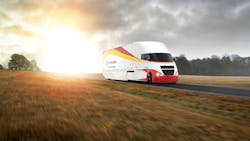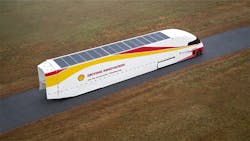Big Oil’s transition to cleaner tech a reason for optimism
Sometimes it seems like you need the Hubble Space Telescope to find a bright spot in 2020, but maybe we’re not looking in the right places. For instance, some of the most intriguing environmental advancements for the transportation industry are coming from “Big Oil,” which now fancies itself Big Energy, if you please.
Knowing that fossil fuels are a finite resource that also create the greenhouse gases alleged to be warming the planet, many major oil producers have now dug into more renewable sustainability innovation, pumping new ideas into a sector that has relied on gasoline and diesel fuel for well over a century.
If you believe the Earth is at risk for catastrophic warming due to human activity, this is quite possibly the most significant rebranding of all time. If you don’t, you’ll still benefit from cleaner, more breathable air that fosters a healthier, happier society.
And the spectrum of revolutionary changes ranges from great to microscopic. Chevron alone has invested $1 billion in carbon capture and storage, a technology that filters the CO2 generated while processing bituminous sands or natural gas. The sequestered carbon can be repurposed into asphalt, carbon nanofibers and even diamonds. ExxonMobil is even working on a way to generate electricity while scrubbing carbon before it wafts into the atmosphere.
On the smaller scale, Chevron also attacks emissions at the tailpipe with the breakthrough engine oil called Delo 600 ADF, which eschews metal additives to decrease sulfate ash by 60% for better engine and diesel particulate filter life while improving fuel economy by 1.2%.
Meanwhile, rival oil company Shell is pioneering an entirely new way to look at the Class 8 truck. The Shell Lubricants division partnered with AirFlow Truck Company to bring a “hyper-efficient” concept tractor-trailer called the StarShip Initiative to life. The heavy-duty truck-and-trailer combo leverages Shell’s knowledge of oils and lubricants, AirFlow Truck Co.’s know-how in bodybuilding and aerodynamics, and a host of forward-facing technologies and materials. Released in 2018, the Starship’s streamlined frame is composed of carbon fiber, while the Cummins six-cylinder engine supplies 400 horsepower and 1,850-foot-pounds of torque.
The trailer also has 15 solar panels capable of producing 4,950 watts. These panels are not strong enough to power a Class 8 truck, but they do reduce parasitic loss in the engine and alternator, explained Stede Granger, OEM technical services manager for Shell Lubricants.
Thermo King has been using a similar setup with its ThermoLite solar panels since 2013, selling tens of thousands of solar panels. The panels support electric auxiliary power units (APUs) for the reefer, liftgate and tractor as well as the engine-based APU, the TriPac Evolution.
“We have customers seeing a 30% reduction and even more in runtime on their APU when they add a 110w Thermo King ThermoLite solar panel to their Evolution system,” said Chad Koll, Thermo King product manager and sales leader for power solutions. The panels pay for themselves “two-fold” due to fuel savings, increased battery life and less maintenance.
“Obviously the green savings are there with burning less fuel in terms of CO2 emissions and reduction in battery replacements,” Koll said.
Overall, all the technology working together on the Starship shows how impactful the clean tech can be while working in concert.
In a May 2018 coast-to-coast run from San Diego to Jacksonville, Fla., the Starship improved fuel efficiency to 8.94 mpg. The national average at the time was 6.4 mpg. Because of varying weight considerations, the more accurate metric to look at, though, is freight-ton efficiency. In that respect, the Starship improved on the North American average of 72 ton-miles per gallon by 2.5 times to 178.4 ton-miles per gallon.
Shell said if all 2 million trucks in the U.S. used the same technology, emissions generated from these vehicles would decrease by 60%. And dropping emissions isn’t just to meet the Paris Agreement’s 2050 goals. The intent was to keep average global temperatures from rising more than 1.5 degree C, which would hypothetically create more severe climatological events.
Shell is preparing for this sea change, targeting a net carbon footprint reduction of its energy products of 20% by 2035, and to adhere to society net carbon footprint goals by 2050.
The company’s New Energies business has several projects around the world, including 16 active or planned in North America.
Shell Rotella is also envisioning a big future role for e-fluids, which help lubricate the wires and batteries and promote conductivity in electric vehicles. That’s a drastic departure from the oily image the brand currently has, and leaders there recognize their will be skepticism.
“I think it is common to get pushback on where a company like Shell fits in a low carbon economy,” said Jason Brown, global technology manager for heavy duty diesel engine oils at Shell. “We talk a lot about our company’s purpose in delivering more and cleaner energy, and I think that’s a goal most people would share. I am a husband and father first, and I want my children to inherit a healthy planet. I also recognize that the world will continue to need more energy to power our lives. To achieve that, I spend today working hard with some of the best people I know to develop technology that will make that future a reality.”
(Author’s note: Last November, I spoke with Brown where Shell Rotella held a press event at Texas A&M University that brought together leading experts in trucking efficiency and energy for a two-day long discussion on sustainable trucking. He seemed genuinely focused on using his position to make a better future.)
The trucking industry, which already went through its own substantial transformation—when fleets switched to selective catalytic reducers a decade ago—must ready itself for an even more dramatic metamorphosis.
As of 2017, medium and heavy-duty trucks accounted for 7% of GHG emissions in the United States, according to the Environmental Protection Agency. That may not seem like a significant number at first, but when those city-sized smog saucers return after disappearing when everyone stayed at home, any amount will seem too much. Hence, the call for lower-emissions, more efficient trucks will intensify.
In the past two years, Shell has worked to incrementally improve the concept truck to shine a light on the latest efficiency-boosting technologies.
“Shell Lubricants is now embarking on a second phase to further showcase our commitment to improving on the results achieved and continue the conversation around the importance of freight ton efficiency as an accurate measure of energy expenditure in the transport sector,” Granger said. “We hope that fleets and owner-operators will adopt similar technologies on their trucks in order to reduce carbon emissions, moving us forward towards a net zero carbon transport future.”
In February, Megan Pino, global brand manager for Shell Rotella, hinted that the aerodynamics and powertrain were two areas of focus. The new version was slated to debut at the ACT Expo in May, but COVID-19 obviously postponed that plan. The next-generation StarShip is expected to debut in 2021 now, according to Shell.
Time is of the essence
Even a one-year delay in showing off Phase 2 of the Starship Initiative could have long-term effects. Regardless of what the Paris Agreement predicts for the climate, society’s energy demand will be too much for fossil fuels alone.
By 2050, Shell estimated 75% of the Earth’s 9 billion natives will be living in cities. Overall energy demand could increase 50%, which with the rise in trucks—required to serve an extra 2 billion humans— will lead to a one-third increase in CO2 emissions. That’s 30 years away, so anything can happen, but it’s important to note Shell’s projections factored in energy intensity falling due to improvements in technology and efficiency. If dramatic changes aren’t made soon, the curve in need of flattening will be measuring greenhouse gases.
The good news is that these corporations known mostly for oil spills and global warming are working toward reversing their negative impact.
“I think everyone, across all parts of society, better understands the urgency of the challenge at hand,” Brown said. “To understand that also means to consider the nature of exponential growth and demand. I believe it is by co-operating, through transformative collaboration, and bringing different sectors together, that we can build this future. We all want an outcome where the world has access to more sustainable energy options.”
About the Author
John Hitch
Editor
John Hitch is the editor-in-chief of Fleet Maintenance, providing maintenance management and technicians with the the latest information on the tools and strategies to keep their fleets' commercial vehicles moving. He is based out of Cleveland, Ohio, and was previously senior editor for FleetOwner. He previously wrote about manufacturing and advanced technology for IndustryWeek and New Equipment Digest.


